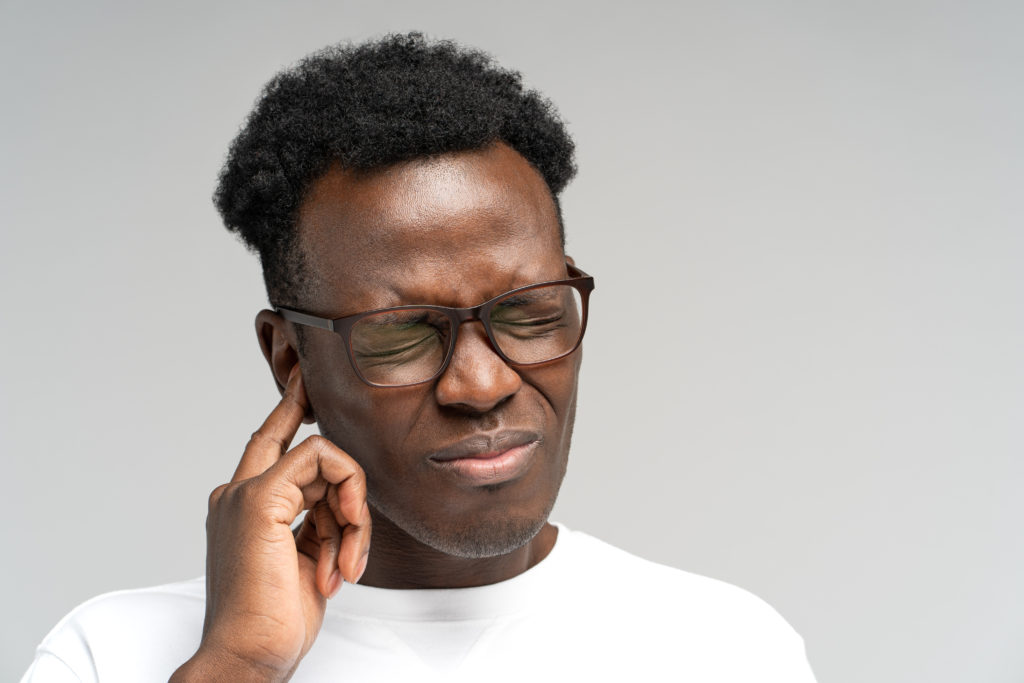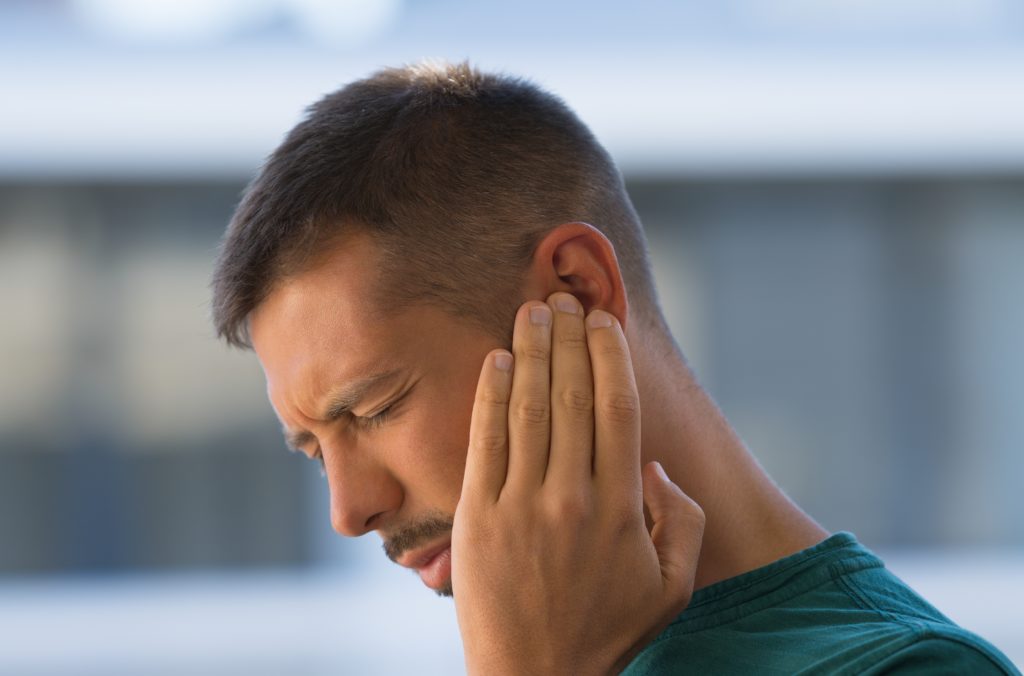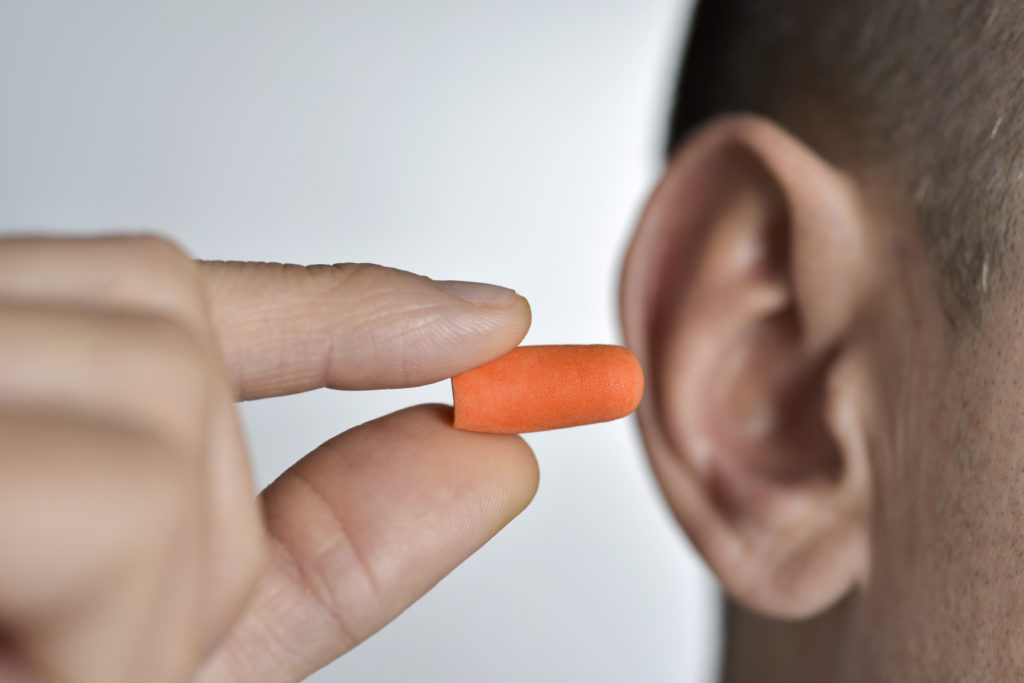January 25, 2023
Sharp Pain in Ear
Sharp pain in the ear is a common symptom, or sensation, that can be experienced by both adults and children. Many factors, including infections and earwax buildup can cause it.
Here’s more about common causes of sharp ear pain, how to relieve it, and when to see a doctor for treatment.
What Does Ear Pain Feel Like?
Ear pain can feel sharp or like a dull, throbbing ache. It may also cause a burning sensation or feel like pressure is building up in the ear.
Ear pain can affect one or both ears. Your pain may quickly come and go or be constant and ongoing. It can come on suddenly or slowly over time.
The way your ear pain feels usually depends on its root cause.
7 Causes of Sharp Pain in Ear
Knowing what’s causing random sharp pain in the ear can help you determine how to treat it on your own at home or if you need it treated by a doctor. Here are seven top causes of sharp pain in the ear.
1. Sinus Infection
Sinus infections can often cause a sensation of sharp ear pain. Also known as sinusitis, sinus infections occur when your sinuses become inflamed and swollen. This can cause mucus to build up, which leads to difficulty breathing through the nose. The common cold usually causes these infections.
 Other symptoms of a sinus infection, in addition to ear pain, include:
Other symptoms of a sinus infection, in addition to ear pain, include:
- Aching teeth
- Headache
- Cough
- Fever
- Fatigue
- Bad breath
Sinus infections usually clear on their own and rarely lead to complications. Possible complications of sinus infections are meningitis, vision problems, and chronic sinusitis. Chronic sinusitis is a sinus infection that lasts for longer than 12 weeks.
2. Earwax Buildup
The ears are designed to drain and remove earwax naturally on their own. However, many people try to remove earwax using cotton swabs, which can actually push earwax farther into the ear. This can cause sharp ear pain and damage to the eardrum and your hearing.
Try removing earwax buildup using over-the-counter (OTC) ear drops. OTC ear drops can help soften earwax so it can naturally drain out of the inner ear. In severe cases, you may need to see an ear doctor, who can safely remove the earwax without damaging your eardrum.
3. Otitis
Otitis is an infection of the inner or outer ear.
The Eustachian tube is affected in infections of the inner ear. This is the tube that connects the middle ear to your upper throat and nasal cavity.
 The ear canal is affected by infections of the outer ear. This is the tube that connects the outer ear to the eardrum.
The ear canal is affected by infections of the outer ear. This is the tube that connects the outer ear to the eardrum.
Both types of otitis can cause sharp pain in the ear. Other symptoms you may experience if you have otitis include:
- Difficulty hearing out of the affected ear
- Sensation of fullness or pressure in the ear
- Irritation or itching in and around the ear
- Discharge draining from the ear
- Fever
- Lack of energy
4. Swimmer’s Ear
Swimmer’s ear is an infection of the outer ear canal. It occurs when water gets trapped in the ear and leads to the growth of harmful bacteria that causes ear pain. It is known as swimmer’s ear because it commonly affects people who spend lots of time in the pool or ocean.
This type of ear infection may also cause redness in the ear, fluid drainage, and muffled hearing. It is usually treated using medications that reduce your symptoms. Certain medicines can destroy the bacteria or fungi causing your symptoms.
5. Foreign Object
Any foreign object stuck in the ear canal — such as a cotton swab — can cause dull or sharp ear pain. Foreign objects in the ear may also cause symptoms including drainage, infection, or hearing loss.
Visit your doctor to help remove a foreign object from the ear canal. Trying to remove the object yourself at home could potentially cause further damage to your ear or hearing.
6. Air Pressure
Changes in air pressure that occur when you are on an airplane or traveling to a higher altitude can often cause ear pain. Your ears can constantly adjust to air pressure changes on their own. However, changes that occur quickly, such as while in an elevator, may cause sharp pain in one or both ears.
If air pressure is causing your ear pain, try swallowing, yawning, or chewing gum. All these behaviors can help the affected ear adjust to the pressure change.
7. Temporomandibular Disorder (TMD)
TMD is a condition that affects the joints that connect your jawbone to your skull. It can occur when these joints become damaged by arthritis or from a sudden blow or injury, such as that which can occur during a car accident.
If you have TMD, you may experience sharp pain in your ears, temples, and jaw. You may also experience problems with being able to open your mouth fully. Your jaw will make popping, clicking, or grinding noises when it moves, or may lock up when you open your mouth.
Common treatments for TMD include oral splints, mouth guards, and surgery.
How to Relieve Ear Pain
Ear pain that doesn’t resolve on its own may be temporarily relieved using OTC pain relievers such as ibuprofen and acetaminophen. You can also try holding a cool or warm compress against your ear, which may help reduce pain or discomfort.
If these treatments don’t work, you may need to see a doctor who can prescribe medication for your ear pain. Your doctor may prescribe stronger pain relievers or antibiotics if a bacterial infection causes your ear pain. You may also be referred to a dentist if your ear pain is caused by an overbite, underbite, or teeth grinding.
Tips on Preventing Ear Pain
Ear pain can be tricky to prevent, especially if you aren’t sure what’s causing it. However, it helps to know what causes sinus and ear infections so you can take the proper steps to prevent them. Steps you can take to avoid sharp pain in ear include:
- Not allowing too much water or hair products to enter your ears when bathing
- Wearing earplugs when swimming in the ocean or pools
- Not smoking and reducing your exposure to secondhand smoke
- Cleaning hearing aids regularly
- Not putting fingers, cotton swabs, or other objects into your ears
- Swallowing, yawning, or chewing gum when riding on airplanes or traveling to higher altitudes
Your doctor may give you additional tips on preventing future ear pain instances, based on its root cause.
When to See a Doctor for Ear Pain
You should see your doctor immediately for ear pain if your pain is severe, blood is coming out of the affected ear, or you have a chronic health condition. Diabetes, heart disease, and kidney disease are examples of chronic conditions.
You should also see a doctor immediately if the following symptoms accompany your ear pain:
- Fever or chills
- Vomiting
- Dizziness
- Severe sore throat
- Changes to your hearing, including hearing loss
- Swelling around the ear
- Fluid draining out of the ear
- Repeat ear infections
- Earache that lasts longer than three days
Healthcare Associates of Texas offers a wide range of healthcare services, including primary care, to help you identify the root cause of pain in your ear, including sharp pain. Request an appointment today to learn more about our many healthcare services.
DISCLAIMER
The information featured in this site is general in nature. The site provides health information designed to complement your personal health management. It does not provide medical advice or health services and is not meant to replace professional advice or imply coverage of specific clinical services or products. The inclusion of links to other web sites does not imply any endorsement of the material on such websites.



